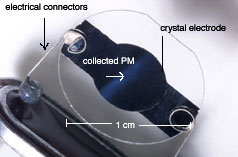APPLICATIONS
OF TECHNOLOGY:
| |
BERKELEY LAB MINIATURIZED SENSOR
|
|
| |
 |
|
| |
Photograph shows a track of particles (blue streak) deposited on the quartz crystal microbalance of a Berkeley Lab prototype. A thermophoretic heater located above the crystal substrate precipitates particulate matter from the air onto the microbalance.
|
|
| |
|
|
- Monitoring occupational settings, industrial and environmental pollution, nanoparticle emissions, ventilation systems, sputter coating processes, and health effects
- Building smart respirators and asthma/allergy warning devices
- Replacing particle number counters such as optical counters and electrometers
ADVANTAGES:
- Simultaneously determines airborne particle mass and performs optical differentiation in real or near-real time
- An order of magnitude smaller than
competing technologies: sensor-on-a-chip
- Power requirements are < 100 mW
- Affordable for monitoring large populations
- Can measure a pico gram of material
|
|
ABSTRACT:
Lara Gundel, Michael Apte, Douglas Black and Anthony Hansen at Berkeley Lab and the University of California at Berkeley have developed the first low cost, miniature devices for identifying and directly quantifying airborne particulate matter (PM). Unlike other PM monitoring systems, these true mass transducers simultaneously measure the mass, size distribution, and optical properties of particulate matter. The devices have power requirements of less than 100 mW and provide data consistent with the federal reference method for PM 2.5 and PM 10 analysis.
The Berkeley Lab PM monitors can be as small as 2-3 cm3 if constructed without optical identification components. A prototype of one device, a Miniaturized System for Particle Exposure Assessment (MSPEA), has been constructed from materials costing $100. A more sensitive prototype, the Berkeley Lab MEMS-PEA, has been manufactured using MEMS fabrication techniques. Because of the very low cost of materials, once scale-up has been achieved, this sensor-on-a-chip will cost significantly less to produce than the lowest priced devices on the market today, which are more than two orders of magnitude larger. In some configurations the Berkeley Lab MEMS-PEA device can measure a single pico gram of material.
The new PM sensors will enable robust assessments of the effects of particulate exposure on human health, and advance industrial hygiene and process control. The devices can replace particle number counters like optical counters and electrometers. They might also be developed into products like smart respirators, ventilation control sensors, mass sensors for bioassay arrays, asthma warning devices, and stack emissions monitors.
The Berkeley Lab devices are the first particulate matter analysis systems that are small, quiet, and affordable enough to enable population-based exposure assessment for large scale studies on the health effects of particulate matter such as second hand smoke, diesel exhaust, or wood smoke. They are ideal for mailing to survey respondents, and unlike other particulate matter analysis equipment, they can be easily deployed by the participant for on-person or in-home monitoring.
Both the miniature and MEMS-scale systems are based on thermophoretic deposition of particles onto piezoelectric mass sensors. Infrared and ultraviolet beams are used to probe the physical characteristics of the collected particles.
|



